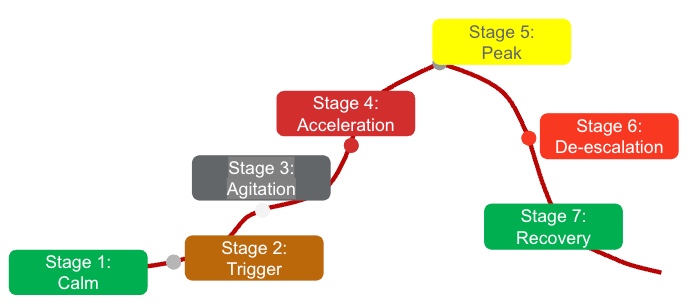Question
What is the cycle of behavior escalation and de-escalation?
Answer

This is an escalation curve showing the cycle of behavior escalation and de-escalation. Children first start at stage one when they’re calm. They are likely happy, following directions, participating in group activities, and doing what you’ve asked them to do.
Then something in the environment happens that is the trigger for stage two. It could be the schedule is different, or maybe they didn’t have as much access to reinforcement. Maybe they were told no, or we took away something they liked. Anything could be a trigger. It might not just be one trigger. It might be an accumulation of things that happened that set the child into agitation. Now they're at stage three, the agitation stage, where they're not able to focus as much, are a little more off task, and just not quite right.
I think stages three and six are the most important stages. If we start to see kids going into the agitation stage, we need to do something then. We need to think about co-regulation and becoming an accommodation versus trying to gain control over the situation. Stop and do something different. Involve them in less stressful activities, more successful things, back up our expectations, or make it a little easier for them. If we don’t do this, we could push them into stage four, acceleration.
When they go to acceleration, the behaviors usually get worse. When they're at stage four, they often move to stage five. Stage five, the peak, is the most provocative behavior. It might be physical harm or destroying property or materials. When we reach stages four and five, it's about safety and giving them space and time. Don’t try to communicate that you’re trying to gain control over the situation. The more you do that, the longer it will take them to calm down and finish the cycle.
One of the biggest things to do is to decrease your verbal interactions. I often see people try to talk kids out of behaviors. When you try to talk them out of behaviors, it makes it worse. Stop talking and give them time and distance. Once they reach that peak, follow any protocols you have and wait until you start seeing signs of de-escalation. The behaviors aren't quite as intense as they were, and maybe they're able to have a little bit more conversation and be a little bit more interactive, but they're still not completely done. At this time, I'm still decreasing expectations. I limit my interactions and still give them space.
We often go too quickly from stage six to stage seven and start putting all these expectations back on them, such as you need to apologize to so and so. Remember, this is not the time for that. Maybe tomorrow, maybe never, but we must give them more time until they can reach stage seven, recovery. Stage seven is when they're able to participate more in their routines. We need to increase reinforcement and success for them, so we help them maintain back at that stage again. Remember, we want to catch them early at the agitation when, if they are accelerating, we can limit our verbal interactions and give them enough time to de-escalate.
This Ask the Expert is an edited excerpt from the course Creating Connections to Better Understand Challenging Behavior in Children, presented by Tara Warwick, MS, OTR/L.
